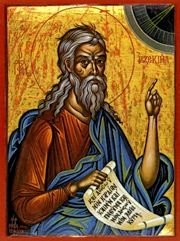The Church of Christ subsists in the Catholic Church: an explanation
I am trying to catch up on some posts, so this is rather an old issue by now, but it is still worth a post. I found this article in "The Link" newsletter of the Archdiocesan Council of Catholic Women (Archdiocese of Dubuque, Iowa) [vol. 50 no. 3, Summer issue 2007]. I find this explanation by Fr. Jerry Kopacek of St. Edward parish in Waterloo, IA. to be a good one.
_________________________________________________________
"The new document goes on to explain how the Catholic Church uses the word 'church' in a rather technical or theological sense to refer to a Christian community that has preserved apostolic succession and all seven sacraments (in particular, the Eucharist and the ordained priesthood)."
In July of this year, the Vatican (specifically, the Congregation for the Doctrine of the Faith) issued a statement having to do with the Catholic Church's understanding of herself as Church and her relationship with other Christian churches and communities. The document's lengthy title is "Responses to Some Questions Regarding Certain Aspects of the Doctrine of the Church" [http://www.vatican.va/roman_curia/congregations/
cfaith/documents/rc_con_cfaith_doc_20070629_
responsa-quaestiones_en.html ]
and it was released with the approval of Pope Benedict XVI. From the reports of the secular media and from the reaction of some of our non-Catholic brothers and sisters, you might get the impression that the Church is saying that all non-Catholisc are unimportant or cannot be saved.
The truth, of course, is something entirely different. This new statement simply restates and clarifies a document from the same Congregation in the year 2000 on the same subject-[ Dominus Iesus, http://www.vatican.va/roman_curia/congregations/
cfaith/documents/rc_con_cfaith_doc_20000806_dominus-iesus_en.html ] that document in turn was based largely on the documents of the Second Vatican Council. The issue at hand is the Catholic Church's doctrine and understanding of herself as Church. This new document reminds us that Jesus established only one church when He lived on this earth, the one Church of which He is head. And to that one Church Jesus entrusted the various elements, teachings and practices that were to be taught to and lived by His followers. These elements include all the seven sacraments Jesus instituted and which are transmitted and carried on through the Church's life and history by means of apostolic succession--through the apostles and their successors (the bishops) in a constant and unbroken line up to our own time. Because of that apostolic succession, the Catholic Church has been able to preserve the faith and the sacramental life in their fullness.
The new document goes on to explain how the Catholic Church uses the word "church" in a rather technical or theological sense to refer to a Christian community that has preserved apostolic succession and all seven sacraments (in particular, the Eucharist and the ordained priesthood). Thus, the various eastern Orthodox Churches (Russian Orthodox, Greek Orthodox, etc.) are true 'churches' in this sense since they have that succession and thus have preserved all the sacraments. We are unable, however, to share full communion with the Orthodox churches since they do not accept the role and authority of the pope as the successor of St. Peter as we do. The various Protestant communities, on the other hand, do not have and do not claim apostolic succession and thus do not have the priesthood or the Eucharist as the Catholic Church understands and lives out those sacraments. Because of those circumstances, those communities are not 'churches'--again, using the techinical or theological definition of the term. They certainly are, however, our brothers and sisters in Christ with whom we share belief in Jesus as lord and Savior and with whom we rejoice in our common baptism and reverence for the Sacred Scriptures as a vitally important element of the word of God. As the document says: "...these separated churches and communities, though we believe they suffer from defects, are deprived neither of significance nor importance in the mystery of salvation. In fact, the Spirit of Christ has not refrained from using them as instruments of salvation".
We need to thank God daily for the gift of our Catholic faith and Church; we need to thank God daily for the fact that Jesus loved us enough to establish the one Church as the means by which His truth and His gospel could be preserved, known, taught and transmitted throughout the world and throughout history. How blessed and privileged we are to be members of the Body of Christ!
-Rev. Father Jerry Kopacek, St. Edward, Waterloo, IA
Labels: apologetics, ecumenism, Holy See (Vatican), Magisterium, Vatican II


<< Home